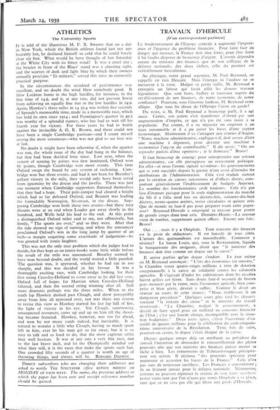ATHLETICS
The University Sports
IT is told of the illustrious M. F. X. Sweeny that on a day in New York, which the British athletes found just not un- bearably hot, he declared himself so cold that he could barely clear six feet. What would he have thought of last Saturday at the White City with its bitter wind? It was a cruel day ; the brazier in front of the Blues' stand was a cheering sight, and the scarves of dark and light blue by which their owners annually proclaim "Et militavi," served this time an eminently practical purpose.
In the circumstances the standard of performance was excellent, and no doubt the wind blew somebody good. It blew Lockton home in the high hurdles, for instance, in the fine time of 14.9, and it, at any rate, did not prevent Irwin from achieving an equally fine run m the low hurdles in 24.9. Again, Hawkey's three miles in 14 39.4 was within five seconds of Sproule's memorable time, made in a memorable race, which has held its own since 1914; and Pennington's quarter in 49.2 was worthy of a splendid runner, who has had to wait till his fourth year for victory. For three years he had to battle against the invincible A. G. K. Brown, and there could not have been a single Cambridge partisan—and I count myself among the most venomous—who was not glad to see him win at last.
No doubt it might have been otherwise if, when the quarter was run, the whole issue of the day had hung in the balance, but that had been decided long since. Last year, when the system of scoring by points was first instituted, Oxford won by points, though Cambridge won more events. This time Oxford swept the board by any system of reckoning. Cam- bridge won but three events, and had it not been for Brearley's gallant victory in the mile, they would only have been saved from ignominy by the discus and the javelin. There was just one moment when Cambridge supporters flattered themselves that they had a hope. Their pole-jumper had cleared a height which had so far defeated Oxford, and Bennett was leading the formidable Norwegian, Sivertsen, in the discus. Sup- posing Cambridge won both these two events—but these rosy dreams were at an end when Loader got away slowly in the hundred, and Wells held his lead to the end. At this point a distinguished Oxford miler said to me, not offensively, but firmly, "The sports are over," and so they were. After that the tide showed no sign of turning, and when the announcer proclaimed Oxford's win in the long jump by quarter of an inch—a margin tequiring some exactitude of judgement—he was greeted with ironic laughter.
This was not the only nice problem which the judges had to decide, for they kept us on tenter-hooks some little while before the result of the mile was announced. Brearley seemed to have won beyond doubt, and the world waited a little puzzled. The question was, it appeared, whether he had cut in too sharply, and this was decided in his favour. It was a thoroughly exciting race, with Cambridge looking for their first string Crossley-Holland to come away as he did last year, Oxford full of hopes for Marrian when Crossley-Holland faltered, and then the second string winning after all. Still more dramatic perhaps was the three miles. When in the tenth lap Hawkey dashed past Clough, and drew perceptibly away from him all appeared over, nor was there any reason to revise this view as Hawkey started his last lap full of fire, the light of victory in his eye. Yet Clough, summoning unsuspected resources, came up and up on him till the shout- ing became frenzied. Hawkey, however, was too far ahead, and won by not many yards indeed, but inevitably. It is natural to wonder a little why Clough, having so much spurt left in him, ever let his man get so far away, but it is so easy to talk and so hard to do, that the most captious critic may well hesitate. It was at any rate a very fine race, run to the last brave inch, and let the Olympically minded say what they will, it is the races that make the sports such fun. One crowded fifty seconds of a quarter is worth an age of throwing things, and always will be. BERNARD DARWIN.
DIRECT subscribers who are changing their addresses are asked to notify THE SPECTATOR office BEFORE MIDDAY on MONDAY OF EACH WEEK. The name, the previous address to which the paper has been sent and receipt reference number should be quoted.














































 Previous page
Previous page